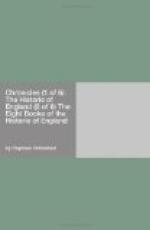At length, after that this noble prince king Edward had reigned somewhat aboue the tearme of 23 yeeres, he was taken out of this life at Faringdon: his bodie was conueied from thence vnto Winchester, and there buried in the new abbeie. He had three wiues, or (as some haue [Sidenote: Polydor.] written) but two, affirming that Edgiua was not his wife, but his concubine, of whome he begat his eldest sonne Adelstan, who succeeded him in the kingdome. This Edgiua (as hath beene reported) dreamed [Sidenote: A dreame.] on a time that there rose a moone out of hir bellie, which with the bright shine thereof gaue light ouer all England: and telling hir dreame to an ancient gentlewoman, who coniecturing by the dreame that which followed, tooke care of hir, and caused hir to be brought vp in good manners and like a gentlewoman, though she were borne but of base parentage.
Heerevpon when she came to ripe yeeres, king Edward by chance comming to the place where she was remaining, vpon the first sight was streight rauished with hir beautie (which in deed excelled) that she could not rest till he had his pleasure of hir, and so begot of hir the foresaid Adelstan: by hir he had also a daughter that was maried [Sidenote: Matt. West. Polydor.] vnto Sithrike a Dane and K. of Northumberland. The Scotish writers name hir Beatrice, but our writers name hir Editha. His second or rather his first wife (if he were not maried to Eguina mother to Adelstan) was called Elfleda or Elfrida, daughter to one earle Ethelme, by whom he had issue; to wit, two sonnes Ethelward and [Sidenote: The issue of K. Edward.] Edwin, which immediatlie departed this life after their father; and six daughters, Elfleda, Edgiua, Ethelhilda, Ethilda, Edgitha, and Elfgiua. Elfleda became a nun, and Ethelhilda also liued in perpetuall virginitie, but yet in a laie habit.




